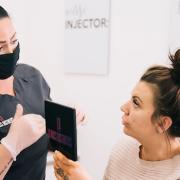Did you know aesthetic practices are not regulated in the UK?
Clinics can legally offer treatments without proper training or qualifications. So, how can we know that the one we’ve chosen is safe?
“We need to probe further, do our research and make sure we’re in a safe environment with experienced people who know what they’re doing. Be fully prepared and know what questions to ask,” says aesthetics nurse, Rachael Roberts, from Avery Aesthetics in Kent.
Rachael is part of the British Association of Cosmetic Nurses (BACN), that are lobbying the government to push through regulation for aesthetic procedures. The goal is to raise awareness of the danger of unregulated treatments.
Below, she shares her advice on finding a clinic you can trust.

Q: Can non-medical practitioners perform aesthetic treatments?
A: Yes, but it doesn’t mean that they are qualified to do so.
In the UK, it’s legal to perform injectable treatments after one or two days of training, with no real experience. This can be extremely dangerous if something goes wrong or the procedure is performed incorrectly. I would always advise having a face-to-face consultation first, so you can check you are suitable for treatment. This also offers a chance to ask the practitioner important questions about their insurance and qualifications.
Ensure you know the following information:
-
The practitioner’s full name
-
The practitioner’s profession (doctor, dentist, nurse, midwife, or pharmacist)
-
The practitioner’s contact details (address, telephone number, and email), as well an emergency contact number in case a complication occurs.

Q: What qualifications do you need to perform aesthetic procedures?
A: You don’t need any official qualifications, so you should ensure that your practitioner is prepared in case things go wrong – don't automatically assume that they are a professional.
Choosing a doctor or nurse who has trained with the NHS is a safe way to ensure that they are experienced and qualified for any circumstance. This will reduce the risk of botched treatments and help keep you safe.
Q: How can I know if I’ve chosen a medical professional for my injectable treatment?
A: Medical professionals are proud of their titles, so it should be immediately obvious if they are a registered doctor or nurse. This information is often displayed on their social media or website.
Practitioners should be registered with a professional body. Any medical professional, such as a doctor, dentist, nurse, midwife, pharmacist, dental therapist, dental hygienist, operating department practitioner or paramedic, will have a pin number. It takes a matter of seconds to check their current status online using a relevant database like the General Medical Doctor’s (GMC) ‘find a doctor’ site. Alternatively, you can search the Nursing and Midwifery Council (NMC) register to find the status of any nurse, midwife or nursing associate in the UK.
All you’ll need is their full name and pin, which you can request from the clinic. Practitioners are accountable to these bodies and are legally required to have indemnity insurance for all treatments which they provide.

Q: How can I rejuvenate my face naturally and safely?
A: The safest way is to build your ‘look’ up gradually and ensure any package deals are thoroughly discussed during a consultation - not every person will need what is being advertised in a package deal, so they’re often not based on an individual's needs. It may seem more affordable, but this could be at the cost of distorting your face and undergoing an unsafe procedure.
Every face is unique, and injecting the same amount of filler into different people will produce varying, and not necessarily desirable, results. The amount of filler needs to be proportionate to the volume of the area – two millilitres of dermal filler in the cheeks would be acceptable, but the same amount in the lip might not. Promoting filler or anti-wrinkle injections should be aimed at enhancing your overall health and wellbeing, and not changing your appearance entirely.
To ensure you’re in safe hands, you should discuss any concerns with the practitioner. They may advise that you don’t even need the treatment you had planned. I’d also recommend having a consultation first and coming back at a later date. This allows for a cooling-off period, for you to consider what you want, without feeling pressured.

Q: What happens if my filler goes wrong?
A: I recommend that you choose a prescribing practitioner, so in the event of something going wrong, they can provide a prescription medication to correct it.
You will need a registered and experienced professional to administer Hyaluronidase (an emergency drug) to break down the filler and reverse the treatment. Chances of full recovery are optimised if this is administered in the initial stages of reaction.
Consistent pain, that feels more than just bruising, and discoloured or red skin that’s hot to touch, are all symptoms that could mean your body is not processing the treatment well.
Q: What can happen if I get too much filler?
A: Excessive filler can cause migration and in some rare cases, vascular occlusion. This means the filler can migrate into other body tissue, causing it to swell or occlude a blood vessel. Your practitioner should be able to offer corrective treatment if this occurs.
Rachael Roberts is an NMC registered nurse with a Master’s degree in Nurse Prescribing. She is a highly experienced medical professional and has specialised in aesthetics for six years, before opening her clinic.
For more information on the professional treatments offered at Avery Aesthetics, visit averyaesthetics.com/. To enquire about a treatment, contact 07392 647205 or hello@averyaesthetics.com.




























